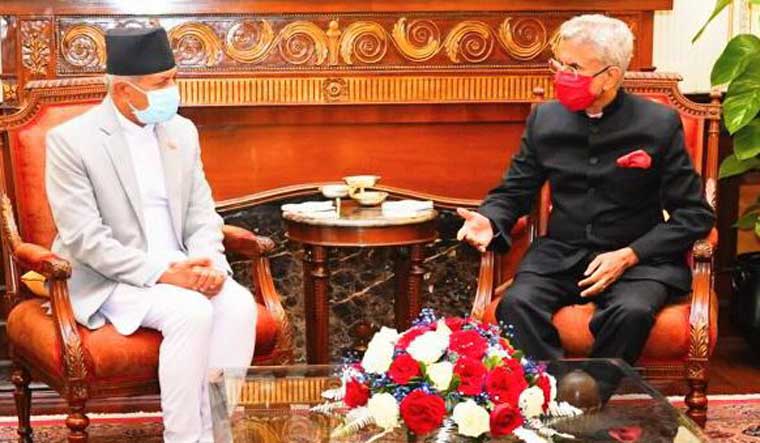A thaw may have begun in Nepal and India ties, but trust remains an issue. Nepal foreign minister Pradeep Gyawali—in India for a three-day visit—made it clear that while the friendship may be on a robust foundation, healthy relationships "require continuous nurturing, creative thinking, promptness and a readiness to respond to each other to the changing dynamics.’’
At an in-person speech at the Indian Council for World Affairs, Gyawali—the first major foreign dignitary in recent months—minced no words as he sent a message to New Delhi that Nepal expects “mutual respect’’ and “equality”.
“Nepal was among the few countries that remained independent throughout its history,’’ he said. “In this very fact…is rooted in an abounding national pride of the 30 million Nepali people. We, therefore, hold dearer than anything else, the principles of sovereign equality, mutual respect and non-interference. We peruse an independent foreign policy and our conduct of external relations is based on a balanced outlook.’’
The past year has seen the relationship between both the countries plummet to a new low over the border issue. While India has tried to mend the relationship with a series of high-level visits in recent months—RAW chief Samanta Kumar Goyal, Army chief M.M. Naravane and foreign secretary Harsh Vardhan Shringla—Gyawali’s speech made it obvious that Nepal has been smarting over New Delhi dragging its feet over contentious issues.
“We desire to see a 21st-century relationship that is forward-looking and firmly founded on equality, mutual respect and based on understanding of each other’s concerns and sensitivities,’’ he said. “We should sincerely attend to issues that we have inherited from the past, address them appropriately and creatively work out the agenda for the future.”
The border issue—which came up at the meeting in South Block, despite Ministry of external affairs spokesperson Anurag Srivastava saying yesterday that the meeting and border issue were separate subjects—might not be as heated as last year, but Nepal is keen to settle it.
He noted that it was India's refusal to sort the contentious border issue points at two spots on the 1,800 km border—at Kalapani and Susta—at the foreign secretary-level meet despite the two countries agreeing on this mechanism in 2014, that created the trust deficit, especially when India went ahead and published its new map. Of course, India has always maintained that the new map is just delineating internal borders, not international ones.
The 6th meeting of Nepal-India Joint Commission has started at Hyderabad House in New Delhi. Hon Foreign Minister @PradeepgyawaliK and the External Affairs Minister of India, H.E. Dr S. Jaishankar are leading the respective delegations which consist of... pic.twitter.com/DCYoKH02WX
— Nepal Embassy, India (@EONIndia) January 15, 2021
Gyawali also spoke about how the two countries have not yet received the report of the Eminent Person's Group which was appointed to look at how the bilateral can be re-energised. The report suggests ways for the 1950 Treaty of Peace and Friendship, the bedrock of the bilateral, to be re-energised.
The EPG is still awaiting a date from the Prime minister's office to present Narendra Modi and K.P. Sharma Oli with the report.
In sharp contrast to the Indian side, which has been careful to make any utterances in connection with Nepal, Gyawali was frank and forthright. "Our economy cannot sustain the alarming trade balance,’’ he said. “We have proposed some genuine measures.”
He was clear in asserting what Nepal wants from the relationship—resolution of historical baggage, investment, access to more Indian ports, and an environment in which Nepal can grow economically. "Economic development should be more important in contemporary conversations," he said, making it clear in which direction they want to take the bilateral, which is multi-faceted.
And of course, be made it more than evident that both should play equal music.
He asserted Nepal's national pride and growing self-reliance when he spoke about how they had scientifically recalibrated the height of Mt Everest last year, an achievement for them.
Given the importance of Nepal for India's foreign policy, and for regional stability, the ball is now in this court.
The joint statement after the meeting with external affairs minister S. Jaishankar states that India will undertake two more cultural heritage projects in Nepal, the Pashupatinath Riverfront Development and the Bhandarkhal Garden Restoration in Patan Durbar, with grant assistance.
They discussed the possibility of a broad gauge link from Raxaul to Kathmandu. The first cross border rail link between Jaynagar to Kurtha is expected to be operationalised soon.
Gyawali noted that there were discussions within Nepal on whether the system of Indian army recruiting soldiers from Nepal should be changed. He said such discussions were birthday in a democracy, but the "government of Nepal had so far not have any new decision."
He also made it clear that he will not entertain India's anxiety over China. When asked about Beijing and India's concern, Gyawali was curt: "We never compare our friendships."





